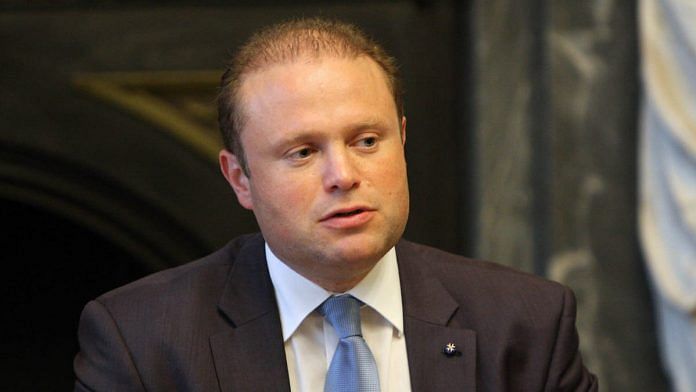New Delhi: Malta’s Prime Minister Joseph Muscat announced Sunday that he planned to step down and said he would ask his Labour Party to start the process of choosing a new leader next month.
Muscat’s decision comes in the wake of criticism he faced for the alleged interference in the investigation into the brutal killing of renowned investigative journalist Daphne Caruana Galizia, who had probed corruption among Malta’s business and political elite, in 2017.
Her revelations drawn from the Panama Papers — secret documents that were leaked in 2016 — accused top ministers in Muscat’s cabinet of corruption. The Panama Papers showed how the rich and powerful used tax havens to hide their wealth. The files were leaked from one of the world’s most secretive companies — Mossack Fonseca in Panama.
In her investigation, Caruana Galizia had accused Muscat, his wife, Michelle, and three ministers — Keith Schembri, former Chief of Staff to the PM, Konrad Mizzi, former tourism minister, and Chris Cardona, economy minister — of being beneficiaries of shell companies listed in the Panama Papers.
Businessman charged
Concerns about the island country’s rule of law escalated after the arrest of 38-year-old business tycoon Yorgen Fenech on 20 November this year on charges of murdering the journalist. He was, however, released the next day and again arrested on 23 November.
He was again released on 29 November and rearrested on 30 November.
The millionaire tried to press charges for “illegal detention” but the court rejected his request. He has also requested a presidential pardon in exchange for information on the journalist’s murder.
Also read: Cyril Almeida, Pakistan’s World Press Freedom Hero who exposed its military-terror nexus
The continued probe
Caruana Galizia was killed when a bomb exploded in her rental car on 16 October 2017 outside her home in Bidnija.
Six months before Caruana Galizia was killed, she had accused Michelle of having a bank account that was used for receiving cash from the ruling family of Azerbaijan, a country with a reputation for corruption and human rights abuses.
Caruana Galizia had alleged that Egrant, a shell company listed in the Panama Papers, was used to receive money from the family of Azerbaijan’s President Ilham Aliyev.
An inquiry conducted in July this year, however, cleared Michelle of these charges.
Despite the journalist’s revelations of corruption in the Maltese government, Muscat’s Labour Party won the June 2017 general elections by a landslide.
Muscat’s party was first elected in 2013 and Schembri, considered his closest aide, led the electoral campaign. That year, he was made the chief of staff in the prime minister’s office with a vision to turn the Labour Party “pro-business”.
Despite the Labour win, Caruana Galizia continued investigating corruption in the government. She was especially critical of Muscat’s passport scheme that allegedly granted EU citizenship to wealthy foreign nationals in exchange for bribes.
‘Executive interference in the investigation’
Prior to the current political and legal crisis surrounding the journalist’s killing, Muscat repeatedly said that the murder case would be solved under his watch.
On 26 November, some journalists’ groups voiced concerns that the prime minister may have a conflict of interest since his wife and administration were at the centre of Caruana Galizia’s reporting.
“We are concerned that the prime minister by placing himself at the centre of the investigation, raises the spectre of undue executive interference in the investigation. The financial interests of Muscat’s cabinet present the serious possibility of a conflict of interest for the prime minister with regard to the investigation,” according to a statement by the groups.
Dunja Mijatović, Council of Europe’s Commissioner for Human Rights, wrote a letter to Muscat last week, raising concerns about alleged political interference into the investigation.
She urged the Maltese government “to ensure that the investigation is fully independent in order to bring long-overdue justice to her family and Maltese society as a whole”.
Also read: On World Press Freedom Day, a look at what Indian journalists have to deal with



